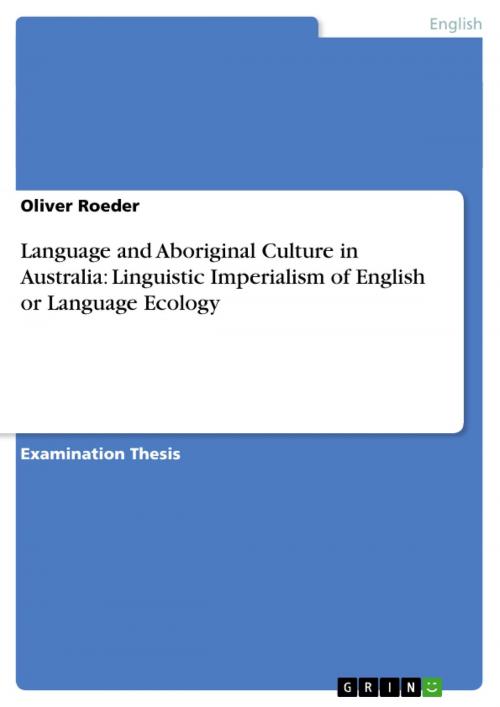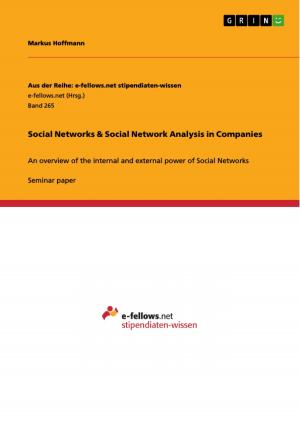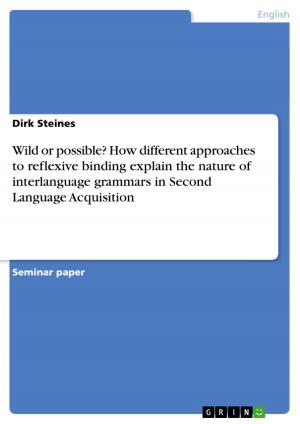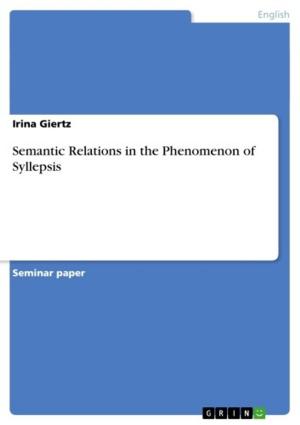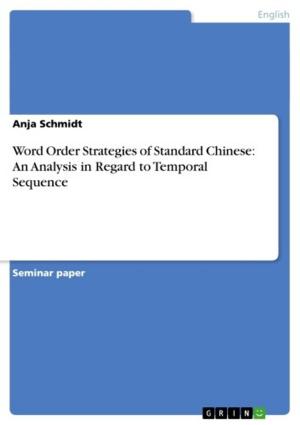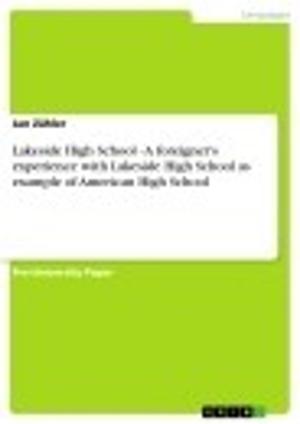Language and Aboriginal Culture in Australia: Linguistic Imperialism of English or Language Ecology
Nonfiction, Entertainment, Drama, Anthologies| Author: | Oliver Roeder | ISBN: | 9783638151733 |
| Publisher: | GRIN Publishing | Publication: | November 3, 2002 |
| Imprint: | GRIN Publishing | Language: | English |
| Author: | Oliver Roeder |
| ISBN: | 9783638151733 |
| Publisher: | GRIN Publishing |
| Publication: | November 3, 2002 |
| Imprint: | GRIN Publishing |
| Language: | English |
Examination Thesis from the year 2000 in the subject English Language and Literature Studies - Linguistics, grade: 2.0 (B), University of Koblenz-Landau (Anglistics), 75 entries in the bibliography, language: English, abstract: This paper is about linguistic imperialism and linguistic ecology in respect of the indigenous languages of Australia. The linguistic complexities in Australia are immense, as are the fields of research of linguistic imperialism and linguistic ecology. Neither is the research in the fields mentioned above terminated nor has the development in Australia reached an end. As a result, the paper is only able to provide a snapshot. The first chapter serves as an introduction. The reader should familiarize her-/ himself with the history and culture of a people, which is unique and distinct from any other civilization. It refers to the initial settlement of the Australian continent, as well as it touches in short specific traits of Aboriginal culture. Answers are provided to questions like, 'What is language?', 'What are the characteristics of Aboriginal languages and Aboriginal English?' Linguistic imperialism will be discussed in chapter two. From what point on can a relationship between any given subjects be called, in its widest meaning, imperialistic? The chapter refers to Galtung (1980), whose observations are still valid today and gives a historical overview of the rise of the English language from a European Germanic language spoken on the British Islands to a global language, especially focusing on the development in the 19th and 20th century. Linguistic ecology is a rather new field of research in linguistics. Chapter three reflects on a research orientation which developed in the 1960s and 1970s due to Haugen, who gave the term ecology a linguistic meaning. It tries to show the parallels between biodiversity and cultural/ linguistic diversity and why it has become so important to be aware that not only plants and animals are seriously endangered and need special protection, but also languages. Additionally, other fields of interest of language ecology are introduced in the chapter. The last chapter deals with the impact European settlement had on indigenous language variety, and the problems contemporary Australian society is confronted with. Australia's language policy will not only be outlined in regard of Aboriginal and Torres Strait Islander's native tongue, but also in regard of community languages. Which possibilities has the Australian government to deal with the problem and which language maintenance efforts have been called into action so far? Australian Aborigines 3 1 Australian Aborigines [...]
Examination Thesis from the year 2000 in the subject English Language and Literature Studies - Linguistics, grade: 2.0 (B), University of Koblenz-Landau (Anglistics), 75 entries in the bibliography, language: English, abstract: This paper is about linguistic imperialism and linguistic ecology in respect of the indigenous languages of Australia. The linguistic complexities in Australia are immense, as are the fields of research of linguistic imperialism and linguistic ecology. Neither is the research in the fields mentioned above terminated nor has the development in Australia reached an end. As a result, the paper is only able to provide a snapshot. The first chapter serves as an introduction. The reader should familiarize her-/ himself with the history and culture of a people, which is unique and distinct from any other civilization. It refers to the initial settlement of the Australian continent, as well as it touches in short specific traits of Aboriginal culture. Answers are provided to questions like, 'What is language?', 'What are the characteristics of Aboriginal languages and Aboriginal English?' Linguistic imperialism will be discussed in chapter two. From what point on can a relationship between any given subjects be called, in its widest meaning, imperialistic? The chapter refers to Galtung (1980), whose observations are still valid today and gives a historical overview of the rise of the English language from a European Germanic language spoken on the British Islands to a global language, especially focusing on the development in the 19th and 20th century. Linguistic ecology is a rather new field of research in linguistics. Chapter three reflects on a research orientation which developed in the 1960s and 1970s due to Haugen, who gave the term ecology a linguistic meaning. It tries to show the parallels between biodiversity and cultural/ linguistic diversity and why it has become so important to be aware that not only plants and animals are seriously endangered and need special protection, but also languages. Additionally, other fields of interest of language ecology are introduced in the chapter. The last chapter deals with the impact European settlement had on indigenous language variety, and the problems contemporary Australian society is confronted with. Australia's language policy will not only be outlined in regard of Aboriginal and Torres Strait Islander's native tongue, but also in regard of community languages. Which possibilities has the Australian government to deal with the problem and which language maintenance efforts have been called into action so far? Australian Aborigines 3 1 Australian Aborigines [...]
